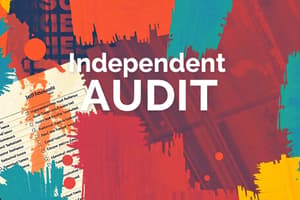Podcast
Questions and Answers
What is the role of the PCAOB in auditing standards?
What is the role of the PCAOB in auditing standards?
- Conducting internal audits for companies
- Issuing financial statements for organizations
- Training independent auditors
- Establishing and enforcing auditing standards (correct)
Which organization established auditing standards under the Sarbanes-Oxley Act of 2002?
Which organization established auditing standards under the Sarbanes-Oxley Act of 2002?
- FASB
- SEC
- AICPA
- PCAOB (correct)
What do AICPA's generally accepted auditing standards (GAAS) provide?
What do AICPA's generally accepted auditing standards (GAAS) provide?
- Templates for financial statements
- Regulations for broker-dealers
- Taxation regulations
- Guidelines for audit conduct (correct)
Which PCAOB standard focuses on independence?
Which PCAOB standard focuses on independence?
What is the primary purpose of AICPA's Code of Professional Conduct?
What is the primary purpose of AICPA's Code of Professional Conduct?
What is the importance of the precepts in AICPA's Code of Professional Conduct?
What is the importance of the precepts in AICPA's Code of Professional Conduct?
What is the role of the Financial Accounting Standards Board (FASB) in auditing?
What is the role of the Financial Accounting Standards Board (FASB) in auditing?
Why are auditing standards crucial for independent auditors?
Why are auditing standards crucial for independent auditors?
What is the purpose of auditor reporting according to FASB requirements?
What is the purpose of auditor reporting according to FASB requirements?
Which of the following is NOT covered by auditing standards?
Which of the following is NOT covered by auditing standards?
What is the primary goal of adhering to auditing standards by independent auditors?
What is the primary goal of adhering to auditing standards by independent auditors?
Which professional bodies contribute to setting established auditing standards?
Which professional bodies contribute to setting established auditing standards?
Flashcards are hidden until you start studying
Study Notes
Independent Auditing: Audit Standards and the Role of Professional Bodies
Independent auditing plays a crucial role in ensuring financial integrity, transparency, and accountability of organizations' financial statements. Various professional bodies, including the Public Company Accounting Oversight Board (PCAOB), American Institute of Certified Public Accountants (AICPA), and the Financial Accounting Standards Board (FASB), establish and enforce auditing standards to ensure consistent and reliable independent auditing practices.
PCAOB Auditing Standards
The PCAOB, established under the Sarbanes-Oxley Act of 2002, creates auditing and related professional practice standards for registered public accounting firms to follow in the preparation of audit reports for public companies and other issuers, as well as broker-dealers. Examples of PCAOB audit standards include AS 1001, which focuses on the responsibilities and functions of the independent auditor, and AS 1005, addressing independence.
AICPA Auditing Standards
The AICPA's Code of Professional Conduct contains precepts to guard against the presumption of loss of independence, emphasizing the importance of intellectual honesty and avoiding situations that may lead outsiders to doubt the auditor's independence. The AICPA also establishes generally accepted auditing standards (GAAS), which provide guidelines for the conduct of an audit and are used by independent auditors to evaluate financial statements.
FASB Principles and Audits Standards
The Financial Accounting Standards Board sets accounting principles, known as GAAP, that guide the preparation of financial reports. While not law, these principles carry significant weight in the industry, and any departure from them must be noted in the auditor's report. Additionally, FASB requires auditor reporting on whether financial statements fairly present the organization's financial position without material misrepresentations or inaccuracies.
Key Components of Auditing Standards
Auditing standards cover various aspects of independent auditing, including overall objectives, planning, risk assessment, internal control evaluation, audit procedures, reporting, and communication with other parties involved. These standards aim to ensure consistent and reliable audits that identify material misstatements and allow stakeholders to rely on audited financial statements.
In conclusion, independent auditing relies heavily on established auditing standards set by professional bodies such as PCAOB, AICPA, FASB, and others. By adhering to these standards, independent auditors can maintain a high degree of quality and reliability in their work, providing valuable insights into organizations' financial health and operations while preserving public trust.
Studying That Suits You
Use AI to generate personalized quizzes and flashcards to suit your learning preferences.




